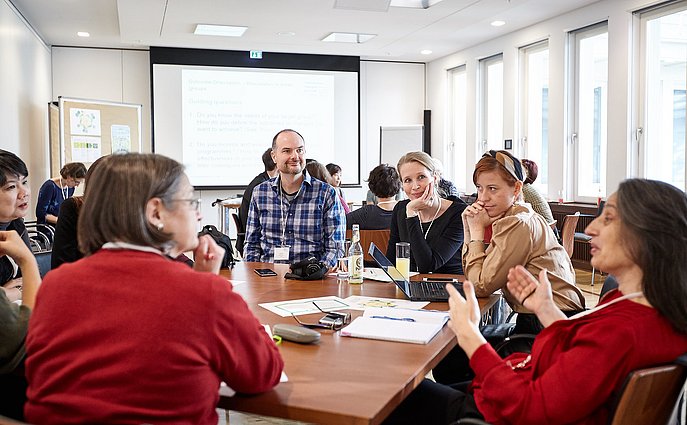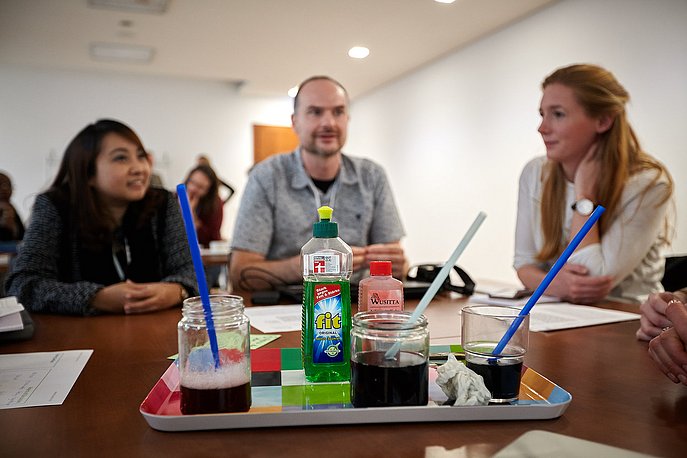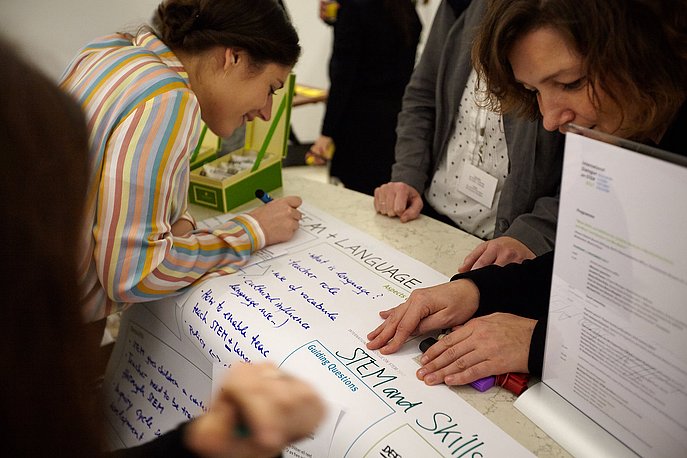BarCamps at IDoS 2019 thrived on open-minded and critical exchanges among the participants. Attendees were not only listeners, but were also actively involved in shaping the camp according to their interests.
Workshops and BarCamp Sessions at #IDoS2019
The workshops and BarCamp sessions at IDoS 2019 all focused on interaction and participation. On the first day of the conference, the attendees worked in six parallel workshops on various topics. On the second day of IDoS 2019, the BarCamp and more workshops awaited the attendees.
-

© René Arnold / Stiftung Kinder forschen
-

© René Arnold / Stiftung Kinder forschen
-

© René Arnold / Stiftung Kinder forschen
Workshops
The sessions at IDoS 2019 touched on diverse topics within the field of STEM Education for Sustainable Development. For the second edition of IDoS, outstanding STEM initiatives from six continents shared their knowledge through the following interactive workshops.
-
How can we share children’s and teachers’ innovations internationally?
Anette Markula, International Project Manager, StarT, Finland
All over the world, innovative ideas are emerging from small things on the local level. These local innovations can be tiny building blocks for something incredibly huge – they can be the foundation for global changes. Nonetheless, these treasures often remain hidden. The working group will discover a range of tools to bridge the gap between the local and the global, to foster global sharing of innovations, and to give children experiences of being STEM experts creating solutions to real-life issues. These tools include digital methods and local networks that will enable the participants to make the hidden and small innovations visible and accessible on the international level.
-
How do we create relationships with governments and financial and scientific partners?
Mary Wakhaya Sichangi, Senior Trainer, Mathematics Education, and Head of Partnerships, Linkages and International Training, CEMASTEA, Kenya
Education for sustainable development is recognized globally as key to building shared prosperity. To realize the vision of an integrated, prosperous and peaceful world, we need to provide young people with relevant technical and vocational skills to operate independently in the 21st century. This session will endeavor to generate dialogue on how to create linkages with governments, financial and scientific partners. The discussion will focus on the importance of collaboration and synergy in supporting the development of STEM education with a view to address factors such as curriculum reform, teachers’ ability to link policy and practice, and the role of school leadership.
-
How can we implement STEM approaches in specific contexts of Education for Sustainable Development?
Ruetai Chongsrid, Senior Director of the Academic Affairs and Youth Science Programme Development Division, National Science and Technology Development Agency (NSTDA), Ministry of Science and Technology, Thailand
In a wide reaching approach such as Education for Sustainable Development (ESD) it is sometimes difficult to implement effective measures which fit individual learning situations in specific contexts. How do we incorporate STEM activities in challenging teaching contexts such as learners with behavioral difficulties, various academic and cultural backgrounds, different demographic and geographic, and capacity of resources supply? During this session participants will be given the opportunity to explore the challenges of promoting ESD through STEM education in challenging contexts.
-
How can we make the most of monitoring and measurement to drive change and improvement in STEM Education for Sustainable Development?
Claudette Bateup, Director of Education at the Australian Academy of Science, Australia
Evaluation of education initiatives can be a high stakes activity that influences funding and capacity for growth. While metrics give us some information, they are only one part of the story. Often, we evaluate programs without a deep understanding of the teacher and student experience. This workshop explores how monitoring and evaluation measures and frameworks influence our ability to find out what works, for whom, and why. We will discuss ways of engaging with program audiences to understand their needs and what success looks like for them, to ensure that monitoring and measurement leads to change and improvement.
-
How do we align STEM Education for Sustainable Development with the SDGs?
Carol O’Donnell, Director of the Smithsonian Science Education Center, USA
Dr Janna Pahnke, Head of Research & Quality Management at the “Haus der kleinen Forscher" Foundation, Germany
Ute Krümmel, Project Manager, Education for Sustainable Development, “Haus der kleinen Forscher" Foundation, Germany
In 2015, the UNDP identified a series of 17 important worldwide goals referred to as the Sustainable Development Goals (SDGs). These goals make up a blueprint for the future well-being of the planet. Education is a crucial part of the SDGs, not only due to its role as a specific goal (Goal 4: Quality Education), but because education is essential to the possibility of progress on all goals. In this workshop, the Smithsonian Science Education Center, in partnership with the “Haus der kleinen Forscher" Foundation, will engage participants firsthand in the components of frameworks for engaging youth in solving the world’s most complex socio-scientific problems.
-
How can we build place-based and culturally relevant educational programmes?
Martín Bascopé, Assistant Professor of Elementary and Early Childhood Education at the Villarrica Regional Campus of the Pontificia Universidad Católica de Chile (UC), Chile
A usual challenge to affront urgent and complex problems from an early stage, such as sustainability or climate change, consist in how and where to start with children. Local knowledge and indigenous traditions can open a lot of starting points to tackle local needs or problems and contribute to a first approach to global and abstract concepts, especially in rural areas. The workshop will create an environment to discuss culturally relevant educational aspects, territorial needs and usual problems related to sustainability in the local communities of the participants. Afterwards we will design collaboratively a first draft of a small or medium scale educational project with specific activities oriented to generate STEM based solutions to local problems or needs.
-
How can we apply design thinking methods in STEM education for sustainable development?
Charlotte Høeg Andersen, Education Director, The Index Project, Denmark
Christine Niewöhner, Senior Project Manager, Siemens Stiftung, Germany
Four years after the launch of the United Nations Sustainable Development Goals (SDGs), the urgency for better and more sustainable solutions is ever increasing – thereby putting pressure especially on today’s youth and future generations. High-quality STEM education provides young people with crucial knowledge to tackle global challenges. But as the nature of challenges is ever-evolving, so too are the needs for new skill sets. In a 90 minutes hands-on workshop, we want to explore with you how design thinking methods can enhance innovative, solution-oriented thinking in STEM education, with a specific focus on the SDGs.
-
Matthias Rumpf, Head of the OECD office in Berlin, Germany
Student assessments such as the OECD’s PISA study provide valuable insights both for policy-making and for school development. However, their potential is not fully used, as decision makers often struggle to understand the results or to draw meaningful conclusions for reforms. Moreover, discussions about student assessments tend to revolve around ideological issues, thereby undermining pragmatic discussions about the implications of these assessments. This workshop aims to identify and discuss strategies for the productive use of student assessments on a policy and a school level.
-
Dr Silvia Montoya, Director, UNESCO Institute for Statistics (UIS)
As the conference programme shows there is a great amount of outstanding STEM initiatives from all over the world bringing the 17 Sustainable Development Goals to life. Nevertheless it is highly relevant to measure the progress we make in achieving these Goals and STEM educational objectives. Only this way we can ensure an improvement of the work of STEM initiatives and find out what kind of interventions are still needed. Therefore this workshop will focus on the following main questions: What indicators can be used to evaluate effectiveness and goals according to the SDG 4 “Education”? And what are the challenges building such a core set of indicator?